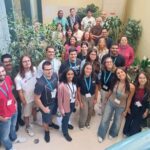The researchers Maria Margarida Diogo, Tiago Fernandes and Ana Rita Gomes, in collaboration with partners from the Faculty of Health, Medicine and Life Sciences at Maastricht University, and Erasmus Medical Center, have made important progress in understanding the role of extracellular vesicle (EV)-derived microRNAs in brain development and Rett Syndrome (RTT).
The study focuses on microRNAs found in EVs, using patient-derived brain organoids to examine how specific miRNA clusters—particularly those from Chromosome 14 and the hsa-miR-302/367 clusters—affect neuronal growth in both typical development and in cases of RTT, a disorder caused by mutations in the MECP2 gene.
By profiling the expression patterns of these microRNAs at various stages of neuronal development, the research uncovered significant differences in Rett Syndrome-affected brain organoids. In particular, the Chromosome 14 miRNA cluster showed a marked upregulation in RTT models. Meanwhile, the hsa-miR-302/367 cluster exhibited time-dependent changes, with specific alterations at later stages of RTT-affected development.
These findings provide valuable insights into the potential of EV-derived microRNAs as biomarkers and possible therapeutic targets for neurodevelopmental disorders like Rett Syndrome.
Link to publication: https://link.springer.com/article/10.1007/s00018-024-05409-7



